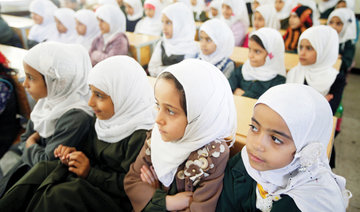AL-MUKALLA: Yemen’s information minister on Wednesday accused the Iran-backed Houthis of human rights abuses against women in areas under their control, described by one victim as “a hell,” in the wake of a new report prepared by a prominent Yemeni rights organization exposing grave violations committed by the militias against females.
Muammar Al-Eryani said the Houthis have abducted and imprisoned women, raided their homes, restricted movement and expression, raped many of them inside their detention centers, and abducted their husbands.
Commemorating International Women’s Day, Al-Eryani called on international rights groups and women advocacy organizations to name and shame the Houthis, and to push for the criminal prosecution of their leaders.
“The war triggered by the Houthi coup militia left unspeakable human tragedies for women. Thousands of them lost their husbands on battlefronts, thousands of women’s relatives were abducted & forcibly disappeared, millions of women were displaced with their children in camps and abroad,” Al-Eryani tweeted.
Mwatana, a local human rights organization, has issued a new report that highlights the violations committed by the Houthis against Yemeni women in Sanaa and other areas under their control.
It accused the Houthis of intensifying its crackdown on women by banning them from traveling without a male relative, expelling them from work, prohibiting them from integrating with men, and preventing them from obtaining contraception.
“Ansar Allah’s dangerous and disgraceful efforts to restrict women’s rights undermines the gains Yemeni women worked for decades to (achieve), and undermines their presence in public space,” said Radhya Al-Mutawakel, chairperson of Mwatana for Human Rights, using the Houthi movement’s official name.
“Ansar Allah should stop this ideological targeting of women, Yemeni women don’t need guards of virtue; they need their rights respected, and accountability for all those who violate them.”
Based on the accounts of many victims of the Houthi crackdown, the organization said that members of the militia insulted a group of women and briefly detained them for moving between cities without a male relative companion, known as a mahram.
“They referred to us as a ‘prostitution cell.’ There were seven armed men who verbally harassed us, put us under terrible psychological pressure for six hours, took our passports, prevented us from getting out of the car, and searched our phones, computers and bags. It was a moment of hell,” a woman, who preferred to remain anonymous, told the organization. She said the Houthis released them only after they had signed a written pledge that she and her friends would not travel without a mahram again.
The Houthis also raided several restaurants, cafes and parks in Sanaa and other areas under their control to impose gender segregation and detain female workers.
The organization said that in January last year 30 women lost their jobs in Sanaa after the Houthis raided their restaurant, abducted the owner and asked him to dismiss female workers who were allegedly “wearing make-up and talking to men.”
The organization said the Houthis denied women access to reproductive health services, including contraceptive pills, without the permission of their husbands; and restricted the distribution of condoms on religious grounds, which forced many women into seeking abortions.
“I came to the health center to pick up my contraceptive pills. They refused to give them to me and asked me to bring my husband so he could give his approval. This is a significant burden,” a 37-year-old housewife from Hajjah province told the organization.
As part of the continuing morality campaigns, the Houthis have banned singing at weddings and public places, abducted women who wear tight clothes in public places and harassed singers, artists and actresses.
The Houthis are still holding Entesar Al-Hammadi, a Yemeni actress, who was abducted from a street in Sanaa early last year, for allegedly violating Islamic dress codes.


























